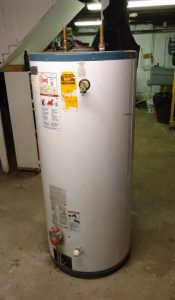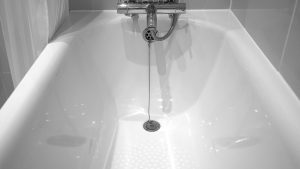Signs to Replace Water Heater Tanks and More
The secret to this article is that if you’re going to be replacing any major part of a water heater, like a tank, it is one of the signs to replace your water heater. However, there are plenty of ways to fix a water heater. If your heating element, pilot light, thermostat, or valve is having problems, this fix is generally easy and inexpensive. A water heater starts heating water and it’s cold water? No worries, that’s not a difficult fix. Today, we are discussing a couple of major signs that it’s time to replace your hot water heater. If you aren’t sure about whether or not you have signs that your water heater is going, call a professional to help you decide.
The benefit of replacing your water heater is that modern water heaters are much better than older ones. They are more energy-efficient, cheaper, and are designed to resist things like corrosion, which cause leaks. Plus, you can upgrade to a larger one. Overall, a water heater may be expensive, but it’s worth it in the end. Have you looked into a tankless water heater?
1. Age of Your Water Heater
 Because water heaters don’t have many parts to break – and those parts of typically easy to replace – one of the biggest reasons for water heater replacement is the age. Usually, the recommended life span of a water heater is 8 – 12 years, and that is with proper maintenance and care. After 10 years in service, your water heater may start developing the problems listed below or may begin working erratically. Usually, once you notice that your water heater is ten or more years old, it’s time to start looking for a replacement. If you have a gas water heater, the life expectancy is even shorter. Start looking at options for gas water heaters after 8 years.
Because water heaters don’t have many parts to break – and those parts of typically easy to replace – one of the biggest reasons for water heater replacement is the age. Usually, the recommended life span of a water heater is 8 – 12 years, and that is with proper maintenance and care. After 10 years in service, your water heater may start developing the problems listed below or may begin working erratically. Usually, once you notice that your water heater is ten or more years old, it’s time to start looking for a replacement. If you have a gas water heater, the life expectancy is even shorter. Start looking at options for gas water heaters after 8 years.
So, how old is your water heater? You may not even know! That’s fine, though. There is a simple trick that you can use with the water heater’s serial number. Try to find the manufacturer’s sticker on your water heater tank. Once you do, you’ll notice a series of numbers following a letter. The letter corresponds to the month (so A = January, B=February, etc). The two numbers following the letter are the last two digits of the year that it was manufactured. So a sticker with the serial number starting with “H09” would have been made in 08/2009.
2. Rusty Water and Leaks
 Two things can come side by side, and they both are bad news. Rusty water in your warm water and hot water means that the minerals in the water are corroding and rusting your tank from the inside. Soon, you’ll have leaks. Rust can happen in any water heater, but it’s more likely to occur in tanks that are older. Over time, rust develops and the tank weakens. Following the rusty water issue, you’ll discover that your water heater is leaking. This means it’s time for a replacement. The good news is that your new water tank will be more resistant to corrosion and leaks, and you’ll have a better life expectancy from your new water heater.
Two things can come side by side, and they both are bad news. Rusty water in your warm water and hot water means that the minerals in the water are corroding and rusting your tank from the inside. Soon, you’ll have leaks. Rust can happen in any water heater, but it’s more likely to occur in tanks that are older. Over time, rust develops and the tank weakens. Following the rusty water issue, you’ll discover that your water heater is leaking. This means it’s time for a replacement. The good news is that your new water tank will be more resistant to corrosion and leaks, and you’ll have a better life expectancy from your new water heater.
But wait! Is rust in the water ALWAYS a bad tank? Not necessarily. Sometimes, the pipes within your home may also be rusty. These two problems have the same effect on your water. However, there’s a way to check whether the problem is the tank or the pipes. Easily enough, all you have to do is fill up two or three buckets with hot water. If the third bucket still has rusty water, your problem is the tank. Not the pipes.
3. Loud and Strange Noises
 If you’ve done your annual tank flushing and you are hearing banging and noises from the water heater in your house, you have a serious issue. The problem lies in sediment buildup in the bottom of your tank. Over time, sediment sinks and hardens in the tank. The annual flushing helps negate some of this, but it still becomes a problem over time. This sediment build up causes banging and rumbling when the water heats up, which can be detected pretty easily. Why is this such a problem, though? While some sediment build up is easily manageable, long-term isn’t. Extensive sediment buildup decreases the efficiency of your heater and causes the heater to become brittle. These rumbling and banging noises in old heaters often mean that a crack or leak is forming. Replace an old water heater quickly if this problem occurs.
If you’ve done your annual tank flushing and you are hearing banging and noises from the water heater in your house, you have a serious issue. The problem lies in sediment buildup in the bottom of your tank. Over time, sediment sinks and hardens in the tank. The annual flushing helps negate some of this, but it still becomes a problem over time. This sediment build up causes banging and rumbling when the water heats up, which can be detected pretty easily. Why is this such a problem, though? While some sediment build up is easily manageable, long-term isn’t. Extensive sediment buildup decreases the efficiency of your heater and causes the heater to become brittle. These rumbling and banging noises in old heaters often mean that a crack or leak is forming. Replace an old water heater quickly if this problem occurs.
Signs to Replace Water Heater Happening to You?
No one likes spending money on big, expensive items in the house. A broken or failing water heater is never good, but it can be an opportunity to improve your house. We use hot water every day for a number of reasons. By losing your water heater, you lose a major utility and a major source of comfort. It’s important to replace your water heater as soon as you know there are problems. When you replace your water heater, you save money in the end with better efficiency and fewer repair costs. Call a professional like Anchor Plumbing in your area. They can help by working through the replacement and installation with you.

No Comments